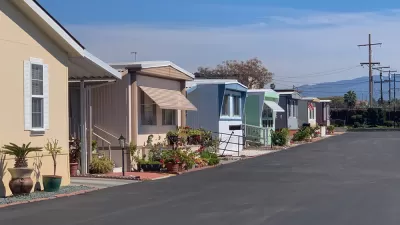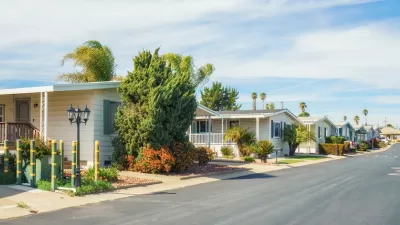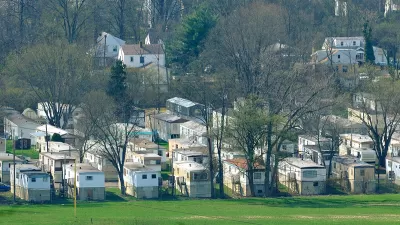With demand surging and rent costs rising sharply, mobile home parks are becoming unaffordable for their most vulnerable residents.

In an article for The Washington Post, Abha Bhattarai highlights growing fears among mobile home residents as rent increases hit mobile home parks around the country. “Surging home prices and rents are cascading down to the country’s mobile home parks, where heightened demand, low supply and an increase in corporate owners is driving up monthly costs for low-income residents with few alternatives.” As we noted in a story last year, “private-equity firms and developers are often circling nearby, looking to buy up such properties and turn them into more lucrative ventures, including timeshare resorts, wedding venues and condominiums.”
With roughly 20 million Americans living in manufactured homes, rising costs for this historically affordable housing option are putting some of the country’s lowest-income households in peril of losing their homes. Although many mobile home residents own their trailer, rising land rents, the cost of moving a mobile home, and a lack of regulations on mobile home rent in most cities put mobile home owners in a precarious position.
“The circumstances surrounding mobile homeownership are yet another way the housing market has worsened long-standing inequities,” Bhattarai writes. “While homeowners enjoyed cheaper mortgages during the pandemic, loans for buying manufactured homes often come with higher interest rates, limited opportunities to refinance and fewer protections than those for typical mortgages, according to a Consumer Financial Protection Bureau report.”
FULL STORY: ‘We’re all afraid’: Massive rent increases hit mobile homes

Alabama: Trump Terminates Settlements for Black Communities Harmed By Raw Sewage
Trump deemed the landmark civil rights agreement “illegal DEI and environmental justice policy.”

Planetizen Federal Action Tracker
A weekly monitor of how Trump’s orders and actions are impacting planners and planning in America.

How Atlanta Built 7,000 Housing Units in 3 Years
The city’s comprehensive, neighborhood-focused housing strategy focuses on identifying properties and land that can be repurposed for housing and encouraging development in underserved neighborhoods.

In Both Crashes and Crime, Public Transportation is Far Safer than Driving
Contrary to popular assumptions, public transportation has far lower crash and crime rates than automobile travel. For safer communities, improve and encourage transit travel.

Report: Zoning Reforms Should Complement Nashville’s Ambitious Transit Plan
Without reform, restrictive zoning codes will limit the impact of the city’s planned transit expansion and could exclude some of the residents who depend on transit the most.

Judge Orders Release of Frozen IRA, IIJA Funding
The decision is a victory for environmental groups who charged that freezing funds for critical infrastructure and disaster response programs caused “real and irreparable harm” to communities.
Urban Design for Planners 1: Software Tools
This six-course series explores essential urban design concepts using open source software and equips planners with the tools they need to participate fully in the urban design process.
Planning for Universal Design
Learn the tools for implementing Universal Design in planning regulations.
Jessamine County Fiscal Court
Caltrans
Institute for Housing and Urban Development Studies (IHS)
City of Grandview
Harvard GSD Executive Education
Toledo-Lucas County Plan Commissions
Salt Lake City
NYU Wagner Graduate School of Public Service





























